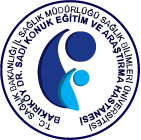ABSTRACT
Objective:
The purpose of this study is to determine the in-service training topics which are demanded by health professionals without doctors working in primary health care agencies and factors related in-service training topics.
Material and Methods:
The study was carried out between December 2014 and February 2015 in city center of Konya. The sample of the study consists of 498 non-physician health professionals (nurses, midwife, health officer) working in primary health care agencies within the city center of Konya. The data have been obtained via using a questionnaire prepared by their searchers via viewing literature. SPSS statistical package program version 17 was used for the statistical analysis of data. Data are summarized using percentage distributions; categorical data were analyzed using the chi-square test. In all analyses, p<0.05 was considered statistically significant.
Results:
45.4% of participants (n: 195) are midwife, 46.6% of participants (n: 201) are graduated from two year degree. 54.2% of participants (n: 233) are working in Family Health Center and 72.8% of participants (n: 307) are whose tenure in the profession is at least 11 years. Only 24% of participants have expressed the requirement of in-service training. New developments and courses have taken first place among the demanded in-service training. As a result, midwife (29.7%) participants, participants with a history of occupational accident (39.4%) and whose tenure in the profession is fewer than 5 years (34.1%) were the ones who demanded in-service training program (respectively p values: 0.024; 0.039; 0.030).
Conclusion:
By examination level of knowledge of health professionals periodically and in-service training should be the identification of needs. Training programmes are also recommended in the consideration of topics they want to learn concurrently.



